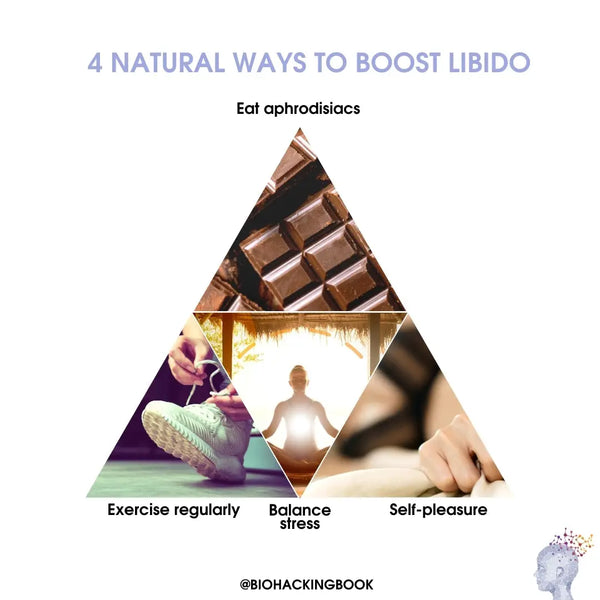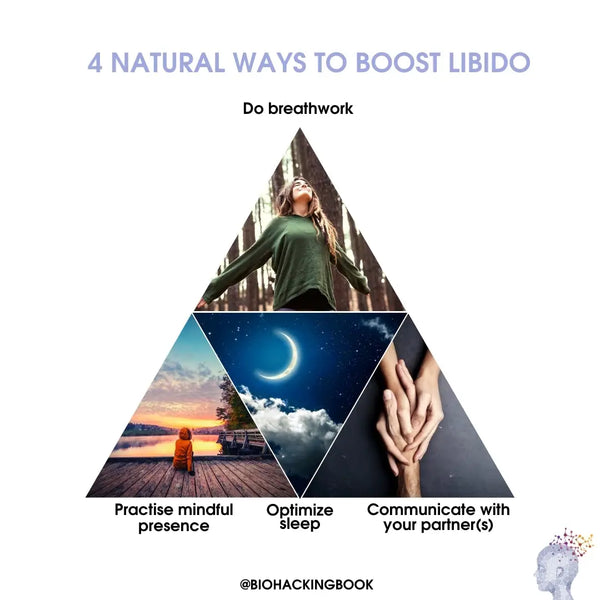Libido (i.e., sex drive) is a term coined to describe sexual desire or motivation for engaging in sexual activities. Libido is multimodally affected by physiological, psychological, social, and emotional factors, and especially well-being in these different areas. If you experience low libido, you are definitely not alone as having a low libido is very common.
Article written by: Anna Lindfors
Edited by: Olli Sovijärvi
Introduction
For example, in Finland 66% of women and 40% of men have experienced low libido. In the US prevalence of Hypoactive Sexual Desire Disorder (HSDD), which includes low libido, ranges from 26,7% for premenopausal women to 52,4% of menopausal women. Similarly, for men aged 16-59 prevalence of HSDD is approximately 25%, and for older men, it rises to 41%. Needless to say, these numbers indicate that low libido is not only globally prevalent but endemic and increasing throughout the lifespan.
Common causes for low libido include:
- Chronic stress
- Hormonal imbalance
- Hormonal birth control
- Poor self-esteem/body image
- Mood disorders (and their medication)
- Aging
- Certain medications
- Difficulties in relationships
- Lack of exercise
Hence methods for promoting healthy levels of libido are often multimodal i.e., take into account various lifestyle factors and dimensions of wellbeing. This article covers eight (8) natural ways to support libido:
EAT APHRODISIACS
Aphrodisiacs are named after Aphrodite the goddess of love. They are thus foods that can support sexual desire and increase libido in various ways. Examples of aphrodisiacs include:
- Maca root
- Oysters (zinc)
- High protein meats (l-arginine & carnitine)
- Salmon (Omega-3)
- Apples (quercetin)
- Red grapes (quercetin)
- Dark chocolate (phenylethylamine and serotonin)

EXERCISE REGULARLY
Exercising boosts blood circulation, raises testosterone levels and releases 'feel good' hormones (e.g., endorphins, dopamine, serotonin). All these factors are important for sexual function and desire, which is why regular exercise can boost libido. However, excessive endurance training can, in fact, lead to decreased libido. Hence, balance is key here as well.
Exercise does not only have physiological libido-boosting effects, but it appears to have psychological benefits as well. In one study, men undergoing Androgen Deprivation Therapy (ADT) for prostate cancer reported experiencing challenges with body image, perceived masculinity, romantic relationships, libido, and engagement in sexual activities. Among other complementary methods, exercise (in a group setting with peer support) contributed to the acceptance of changes in libido and engagement in sexual activities resulting from their illness. This, in turn, resulted in enhanced sexual wellbeing.
BALANCE STRESS
High levels of the stress hormone cortisol are associated with decreased sexual response (e.g., arousal) and libido. This is especially the case when stress becomes chronic. Then again, engaging in sexual activities is associated with decreased levels of cortisol. Therefore, finding suitable ways to optimize stress can support one’s libido. One method is listed right below!
ENJOY YOURSELF
Self-pleasure (i.e., solo sex) can both relax and enhance one’s (sexual) self-esteem. In addition, it is a good way to get to know one’s subjective sexuality (i.e., one’s personal sexuality) and explore one’s preferences (e.g., fantasies) in a safe way. In fact, becoming more tuned to one’s body and sexual response can enhance both perceived and experienced sexual pleasure. Another benefit of self-pleasure is that engaging in sexual activities on a regular basis (and experienced pleasure in response to that) can promote sexual desire. Hence self-pleasure is a great method for boosting libido and overall sexual satisfaction!
DO BREATHWORK
The importance of breathwork in enhancing sexual desire, connectedness, and pleasure was already discussed 2000 years ago by the ancient Taoists in China. Breathing is an effective way to impact the autonomic nervous system either via activation (sympathetic nervous system) or relaxation (parasympathetic nervous system). State of arousal is connected to the state of breathing i.e., when you are sexually stimulated your breathing becomes faster. But this goes the other way as well: faster breathing can increase your state of arousal. Then again, deep breathing is an effective way to activate the parasympathetic nervous system and therefore a method for relaxation. Hence, breathwork is definitely a method worth exploring when the goal is to support libido.
PRACTICE MINDFUL PRESENCE
Taking moments for being present with yourself on a daily basis and consciously connecting with your body can not only enhance sexual wellness but also facilitate tantric connections (with yourself and others). For example, did you know that orgasm and meditation can have similar effects on the brain? Both can increase the blood flow in the prefrontal cortex.
Further support for the benefits of mindfulness practice for boosting libido comes from observed similar neuroendocrine effects (e.g., the release of oxytocin “the love hormone”). One study, found an association with mindfulness and perceived sexual arousal. In other words, those who were more aware of their emotions and sensations reported experiencing more arousal in response to sexual stimuli. Interestingly, oxytocinergic responses via the neuroendocrine system (measured from saliva) were aligned with both perceived mindfulness and arousal, which suggests that the attentional component of mindfulness could impact sexual arousal via the neuroendocrine system, the oxytocinergic system in particular.
Additionally, one study provided preliminary evidence to support the effectiveness of a mindfulness-based psychological intervention (i.e., attentional presence in the moment and focus on sexual response eliciting stimuli) for women with Sexual Arousal Disorder in promoting sexual desire and arousal. This evidence, again, supports the benefits of practicing mindful presence as a method for boosting libido.
OPTIMIZE SLEEP
The importance of sleep for any area of wellbeing cannot be overstated. When it comes to libido, restorative sleep is especially important as poor sleep is associated with low libido. Engaging in sexual activities is probably the last thing on your mind when you are sleep-deprived. For example, menopausal women, among whom low libido is the highest, suffer from poor sleep in addition to other hormonal symptoms which could further decrease libido. In contrast, adequate sleep quality can support one’s wellbeing and ability to ‘cope’ with symptoms associated with menopause and support libido. In men, high-quality sleep is positively correlated with sexual function. In contrast, poor sleep quality is associated with erectile dysfunction.
It appears that, in particular, the effects of sleep on libido could be via the neuroendocrine system. During sleep, the body releases testosterone, which is a key sex hormone for sexual function and desire. Hence, poor sleep or decreased sleep quality is associated with lower levels of circulating testosterone in the bloodstream. Levels of testosterone are linked to high/low libido, which could provide insight into the connection between sleep quality and libido. All in all, optimizing sleep quality can be beneficial for boosting libido in addition to its other benefits for overall wellbeing.

COMMUNICATE WITH YOUR PARTNER
Communication is key in any relationship, but in romantic ones, it can support libido and engagement in sexual activities. It is common to have mismatching libidos in a relationship, which is why communicating one’s needs and desires is key as well as giving one’s partner a safe space to express their feelings.
Discussing your libido, or not to mention the disparity existing between sexual desire experienced by your partner, might feel challenging at first but studies suggest that constructive communication can, in fact, support your (and your partner's) libido. It is definitely worth exploring open communication in intimate relationships, not only to boost libido or sexual satisfaction but overall wellbeing in the relationship.
N.B. changes in libido throughout various life situations are normal – sometimes one’s libido is higher, sometimes lower. However, if low libido becomes chronic or starts to disrupt one’s life it is advisable to consult a specialist to get to the root cause of the problem.





